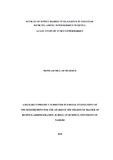| dc.description.abstract | The norm of business and its environment is rapidly changing. Today, a number of factors
including internationalization, artificial intelligence, diminishing resources, decreasing
markets, increased substitutes, ever advancing technology and increased consumer
awareness are dictating competitive advantage. Literary every dimension of thoughts is put
into practice and as result all manner of imaginations are converted into business ideas. All
factors these when combined produce a market force that stretched the competitive
advantage to the next higher level. A level that many businesses must struggle to attain.
Consequently, then many firms are now capitalizing on a number of smart services and
practice. While other are widening by use of collaborations and diversification, some are
aligning themselves towards supply market intelligence which in is turn used to enable
strategic sourcing for effectiveness and efficiency. To obtain supply market intelligence,
firms must invest in systems that detect and investigate random needs. These systems are
known as supply market intelligence sources and they include peer companies, advisory
programs and request of information, supplier interview, supplier relationship management
and performance reporting among others. The use of such sources enhances the ability to
identify the best supplier partner who can actually help roll out the competitive perspectives
of cost, quality, schedule and timing, risk management and effectiveness and efficiency.
The assumption herein is that if a source or a pool of sources can be able to create an
environment from which the competitive perspectives can be translated into the strategic
sourcing then competitive advantage can easy be attained. This study is based on such
understanding. It investigates on the supply market intelligence sources used in strategic
sourcing by supermarkets in Kenya. The study takes a case study research design on Tuskys
Supermarket Limited. Using content analysis, the study established that peer companies,
advisory programs, request of information, supplier interview, supplier relationship
management and performance reporting sources are used to obtain supply market
intelligence. The study further identifies substantive influence of the sources on the
strategic sourcing process and outcome. Findings also indicated a number of challenges
associated with the sources. However, most of the challenges are categorized as
controllable. The study concludes that supply market intelligence has high influence on
strategic sources. The study has two limitations. The first one is on the use of few supply
market intelligence sources when there exists a pool from which most supermarkets apply.
The second limitation is on methodology. The study utilized qualitative analysis rather than
a quantitative approach: Quantitative approach can aid in establishing a quantified
influence of the sources on strategic sourcing. The study suggests for further research using
quantitative approach and involving all sources of supply market intelligence. | en_US |



